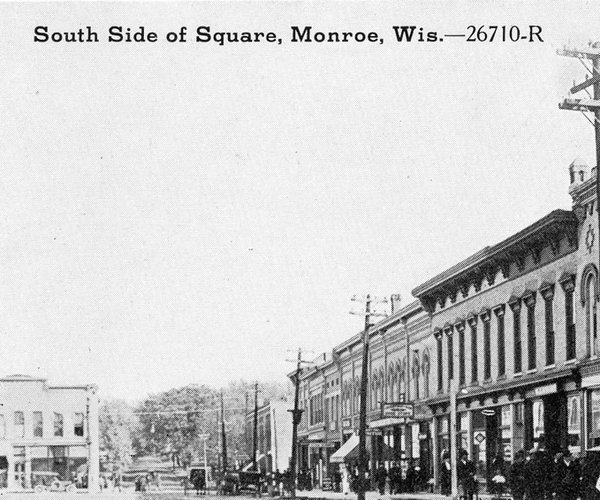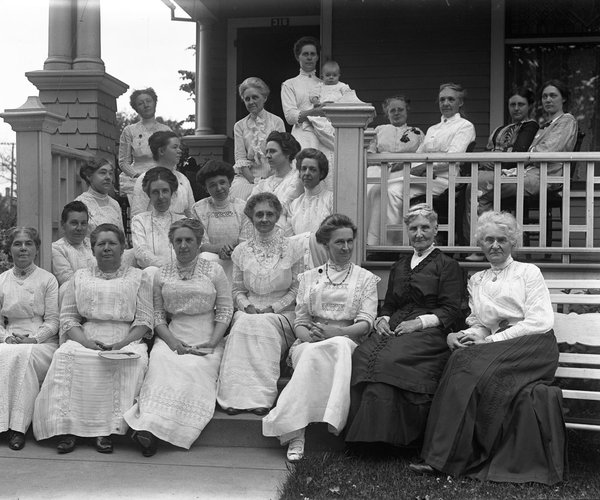It appears that a Mr. Porter may have been the proprietor of the United State House in July 1867 as it was reported on October 30 that Louis Schuetze, owner of the property, had taken control of the house. Schuetze was a “young man of energy,” who was expected to bring up the old United States to something like its former standing as a hotel.” It was reported in the same newspaper that Schuetze was married to Caroline Miller, daughter of Anton, at the Miller home on October 26 by S. W. Abbott.
Mr. Schuetze may have been the longest owner of the property. He seemed to make constant improvements to the property. In June 1870 he was “making some very good improvements about his Hotel and stable. His premises look as clean as a New England kitchen.” The following month a Mr. Stone was building a new sidewalk along the lots belonging to the United States House, which “will be a great improvement when finished.” In October the hotel was receiving a coat of white paint.
The 1870 census showed Louis, Caroline, and their two sons, George and Albert, living in the hotel with six residents who appear to be employed in town. In addition, there were five domestic servants, a bar keeper, a clerk in the hotel, and an ostler living there. Mr. Schuetze’s real estate was valued at $5,000 and his personal property at $8,000. One of the residents, B. N. Rusch, a 34-year-old immigrant from Holstein, Prussia, who worked as a tobacconist had real estate valued at $2,600 and personal estate at $600.
It was reported on June 14, 1871 that Schuetze was again making “substantial improvements in his Hotel. Louis keeps a good house, and is a popular landlord.” It was announced in March 1873 that Schuetze had “concluded to put another story on his hotel this summer and otherwise improve his house.” I saw nothing in the papers about that happening. An interesting article in the July 16 Sentinel stated, “L. Schuetze has concluded to take the hotel bull by the horns, and put up a brick hotel next Spring. We can’t see why Louis cannot keep the hotel business just as well as to let some other man come in and jump ahead.” Again, there was nothing in the paper about Schuetze building a new hotel.
Schuetze continued to make improvements to the hotel with papering, painting, plastering, scrubbing and more being done in May 1874, all in an effort to attract customers to his well-known hotel. The Sentinel reported on August 12 that the hotel was again “improved with a new smooth sidewalk,” only four years after having replaced it previously. Those boardwalks were slippery when wet and didn’t have the longevity of our concrete walks.
It was shared in February 1877 that Schuetze had added an elegant writing table, a very desirable piece, to his office. It was made of “solid walnut, carved and ornamented with beautiful painted glass cards of some of the principal business houses of Monroe. Louis is bound not to be behind the times in furnishing conveniences for his guests. Six or eight persons can sit at this table and write at one time. The United States is still ahead, you know.”
The bar keeper at the United States House was arrested by the Village Marshall in July 1877 for selling liquor without a license. Cohn’s lengthy trial concluded on Saturday, August 4 during which a number of witnesses were sworn. The jury retired at noon and were out only a few minutes when the tap of the Court House bell announced the jury had agreed. Cohn was found guilty and “fined $15 and the costs made up the sum of $66.50.” The defendants gave notice of appeal, but nothing more was found about that.
At the same time, Schuetze was adding a large cistern behind his buildings, one that would hold several hundred barrels. “All our citizens appreciate the necessity of having plenty of water.”
Another case involving Louis Schuetze went to court on Saturday, September 1. A Mrs. Zweifel had “never considered Mr. Schuetze a spy until lately, and that she thinks him one yet; and this without anybody telling her so; she simply took it from facts which have been told to her.” She pleaded guilty to two indictments.
Louis was back in court again the next year when the Sentinel reported on January 23, “Louis Schuetze and his clerk were arrested on complaint of Village Marshall Cleveland on Monday, for selling liquor without a license. They were found guilty and fined $35 and costs. We didn’t suppose Louis would do such a thing.” A correction printed the following week stated that Louis had been acquitted; the barkeeper had to pay nearly $60. The editor added to the correction, “There can be no doubt, now, that Louis will discharge his bar-tender for violating the law, and thereby throwing a cloud of suspicion over the good name of the United States House for flagrant and persistent violation of the laws of Wisconsin.”
There will be more about the business in the next two columns.
— Matt Figi is a Monroe resident and a local historian. His column will appear periodically on Saturdays in the Times. He can be reached at mfigi48@tds.net or at 608-325-6503.




